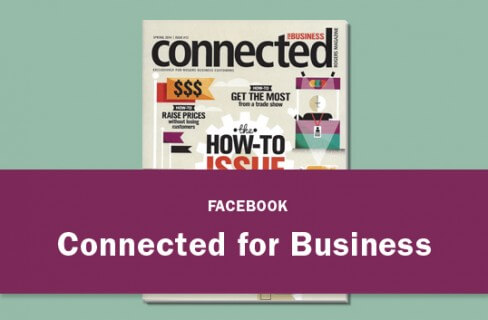Choosing the Right Social Media Platform for Your Small Business
March 12, 2015

Choosing the right social media marketing strategies can generate sales and grow your small business
By Maureen McCabe
I was recently interviewed by Jay Somerset for an article in Connected For Business, Rogers’ business and technology magazine for small business owners. The article focused on how social media can generate sales for small business owners, and if Facebook is always the right platform to use. As a small business marketing professional with hands-on experience using a variety of social networks, I was happy to give suggestions on when to use Facebook to help leverage your business growth.
There are many social media platforms out there that can help generate sales, but how do you know which one to use? By carefully planning out your social media strategy, you can narrow down which social platforms you should be using to just a few sites.
So what is the difference between Facebook and other social media platforms? Here are some key comparisons to help you determine which sites you should be using for your social media marketing.
Facebook
This platform is popular among businesses and individuals, with over one million users to date. Small businesses can create a page for posting photos, videos or written statuses to anyone who has Liked their page. There is also an option to boost your posts to a targeted audience where you can control a post’s reach and frequency. Other options include advertising your business so the ad appears on the right side of the site or in users’ news feeds.
Facebook is a great option for small businesses that can post about contests, promotions, challenges and quizzes, as well as share videos, links and pictures. It is also a platform to have conversations with your customers and get them to engage with your business. Remember that Facebook offers a chance to represent the human side of your brand.
Twitter
There are currently over 215 million active monthly users on Twitter! This network is a microblogging site that limits your posts to just 140 characters and allows hashtags to expand your reach and engagement. This platform is more information-oriented and allows you to prove yourself as an industry expert. You can also direct traffic to your website to generate leads. As well, Twitter just recently introduced its Quick Promote tool to allow small businesses to easily buy ads and target posts, with the goal of generating sales leads.
You should use Twitter for your small business marketing if you have industry information to add to trending topics by sharing statistics, quick tips, news stories and contests. Some of the most popular topics to Tweet about include finance, news, science and sports.
Pinterest and Instagram
Pinterest allows you to organize photos and images by boards so it’s easy for followers to find information, as opposed to Instagram, where you must know ahead of time which topic you want to explore. These platforms are both visually based, and users and businesses can post photos with descriptions and hashtags. There is no limit to hashtags, unlike Facebook and Twitter, where you want to keep them to a maximum of four per post. Both networks support sponsored posts that you can take advantage of.
Small businesses should leverage these platforms if they’re in a niche market, or have images related to some of the most popular visual content categories, including beauty, fitness, shopping, food and drink; however, just about any topic can be posted. Explore both platforms to see if your business industry can be represented visually and if it’s a good fit for your social media strategy.
LinkedIn
LinkedIn is a B2B (business-to-business) platform where small businesses can post industry-related information, employment opportunities and, most importantly, connect and network with other businesses. You can join groups, follow influencers and participate in communities for opportunities to converse. Another unique feature includes getting reviews and recommendations from customers or other businesses so your LinkedIn presence gains credibility and develops an excellent brand reputation. I recommend that all small businesses leverage this platform.
Small business marketing with social media doesn’t need to be overwhelming. No matter what platform you’re using, I advise small businesses to think like their customers. Research your audience’s interests and interact with them how you would want to be interacted with.
Remember to post more non-sales updates compared to posting about special offers and products or services. A general rule used to be to post during business hours and early evenings, but that was before smartphones, laptops and tablets were widely used. Today, the best times to post can be nearly any time of day, depending on your unique audience– especially if you’re targeting customers in various countries. Use social media to connect with your audience and increase your conversion rates.
Marketing Companies Toronto | Marketing Agency Toronto
- Marketing Services
- What We Do
- 10-hour Starter Package
- Marketing Strategy
- Marketing Plan
- Attract & Keep Customers
- Website Marketing
- Promotional Marketing & Ads
- Online Video Marketing
- Branding
- Marketing Materials
- Marketing Tools
- Why Choose Us
- Maureen McCabe, Small Business Marketing Consultant
- Small business marketing Toronto
- Help You Grow
- Video Gallery
- Marketing Fees
 Free Consultation
Free Consultation Marketing Check-up
Marketing Check-up Free Marketing Report
Free Marketing Report Free SEO Template
Free SEO Template Make An Inquiry
Make An Inquiry



